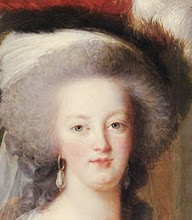If you've been following the new and upcoming releases about the
French Revolution, then you may have noticed an abundance of titles from
the University of Wales Press! Although I haven't had the time to read
any of these titles yet, they definitely look interesting.
Footsteps of Liberty and Revolt: Essays on Wales and the French Revolution by Mary-Ann Constantine and Dafydd Johnston
[June 15, 2013]
All
of Europe was swept up in the events of the French Revolution and the
radical restructuring of society that occurred in its aftermath. This
collection of essays by leading academics explores how Welsh clerics,
diplomats, singers, poets, journalists, and soldiers—many of whom
traveled to Paris to witness the conflict firsthand—responded to the
Revolution.
Edward Pugh of Ruthin 1763-1813: "A Native Artist" by John Barrell
[May 15, 2013]
Edward
Pugh of Ruthin 1763–1813 is the first book to consider the work of this
nearly forgotten Welsh artist and writer in detail, linking the history
of art in Wales with the social history of the country. John Barrell
shows how Pugh’s pictures and writings portray rural life and social
change in Wales during his lifetime, from the effects of the war with
France on industry and poverty, to the need to develop and modernize the
Welsh economy, to the power of the landowners. Almost all of the
pictures and accounts we have today of late eighteenth and early
nineteenth century North Wales were made by English artists and writers,
and none of these, as Barrell demonstrates, can tell us about life in
North Wales with the same depth and authenticity as does Pugh.
English-Language Poetry from Wales, 1789-1806 by Elizabeth Edwards
[April 15, 2013]
This
anthology presents a selection of poetry from Wales written in English
in the years following the French Revolution of 1789. Arranged
chronologically, it brings together a wide selection of little-known
texts, some of which are published here for the first time. A
comprehensive introduction sets the poems in their cultural and
historical contexts, while detailed endnotes give concise biographies of
the writers—where known—and explain specific references within the
texts.
The Fantastic and European Gothic: History, Literature and the French Revolution by Matthew Gibson
[April 15, 2013]
This
fascinating study examines the rise of fantastic and frénétique
literature in Europe during the nineteenth century, introducing readers
to lesser-known writers like Paul Féval and Charles Nodier, whose
vampires, ghouls, and doppelgängers were every bit as convincing as
those of the more famous Bram Stoker and Ann Radcliffe, but whose
political motivations were far more serious. Matthew Gibson demonstrates
how these writers used the conventions of the Gothic to attack both the
French Revolution and the rise of materialism and positivism during the
Enlightenment. At the same time, Gibson challenges current
understandings of the fantastic and the literature of terror as
promulgated by critics like Tzvetan Todorov, David Punter, and Fred
Botting.
Welsh Poetry of the French Revolution, 1789-1805 by Cathryn A. Charnell-White
[February 15, 2013]
This
anthology presents a selection of poems written by Welsh writers living
in Wales and London in response to the French Revolution. Edited and
translated from Welsh into English for the first time, these poems
artfully capture this period of unprecedented change and upheaval,
challenging what it meant to be Welsh, British, and patriotic amid
shifting views on religious affiliation. Accompanying the English poems
are the Welsh originals as well as explanatory notes and an introductory
essay that provide context.
Travels in Revolutionary France and A Journey Across America by George Cadogan Morgan and Richard Price Morgan
[January 15, 2013]
In
July 1789, Welsh-born George Cadogan Morgan, the nephew of the
celebrated radical dissenter Richard Price, found himself in France at
the outbreak of the French Revolution. In 1808, his family left Britain
for America, where his son, Richard Price Morgan, traveled extensively,
made a descent of the Ohio and Mississippi Rivers by raft, and helped
build some of the early American railroads. The adventures of both men
are related here via letters George sent home to his family from France
and through the autobiography written by his son in America.
Welsh Responses to the French Revolution: Press and Public Discourse, 1789-1802 by Marion Loffler
[July 15, 2012]The
French Revolution inflamed public opinion in Wales just as it did
throughout the world. Welsh Responses to the French Revolution delves
into the mass of periodical and serial literature published in Wales
between 1789 and 1802 to reveal the range of radical, loyalist, and
patriotic Welsh responses to the Revolution and the Revolutionary Wars.
This anthology presents an English-language selection of poetry and
prose published in the annual Welsh almanacs, the English provincial
newspapers published close to Wales’s border, and the three radical
Welsh periodicals of the mid-1790s, all alongside the original Welsh
texts. An insightful introduction gives much-needed context to the
selections by sketching out the printing culture of Wales, analyzing its
public discourse, and interpreting the Welsh voices in their British
political context.
Welsh Ballads of the French Revolution: 1793-1815 by Ffion Mair Jones
[April 15, 2012]
Welsh
Ballads of the French Revolution is a collection of ballads composed in
reaction to the momentous events of the French Revolution and the two
decades of war that followed. Ballad writers first responded in 1793,
when the French monarchs were executed and France declared war upon
Britain, but as the decade proceeded, sang in thanks for the victory of
British forces and to the extensive mobilization of militia and
volunteer forces. This volume, complete with parallel English
translations of the original Welsh texts and copious contextualizing
notes, introduces readers to this telling corpus for the first time and
to a host of little-known authors.


